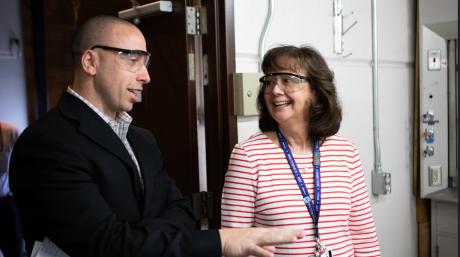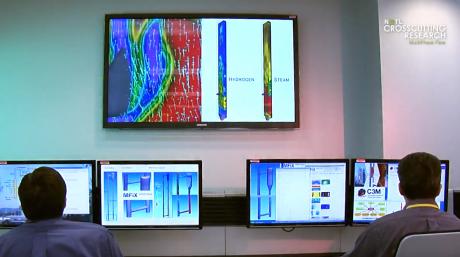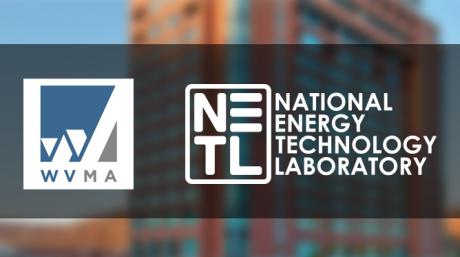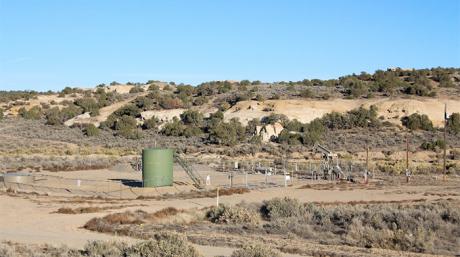U.S. Department of Energy’s (DOE) Assistant Secretary for the Office of Cybersecurity, Energy Security, and Emergency Response (CESER) Karen S. Evans visited NETL in Morgantown Thursday, April 11 to meet with laboratory leadership and discuss ongoing DOE efforts aimed at improving cybersecurity.
The visit was a return to Morgantown for Evans. She earned an MBA and a BA in chemistry from West Virginia University.
Today, the U.S. Department of Energy (DOE) and NETL have announced up to $87.3 million in federal funding for cost-shared research and development (R&D) projects for advanced coal technologies and research. DOE Assistant Secretary for Fossil Energy Steven Winberg announced this R&D funding at the Annual Project Review Meeting for Crosscutting, Rare Earth Elements, Gasification, and Transformative Power Generation at the National Energy Technology Laboratory.
The U.S. Department of Energy’s (DOE) National Energy Technology Laboratory (NETL) recently kicked off Phase II of an electric grid security project with Colorado-based company Taekion, formerly known as Grid7, LLC, that aims to prevent cyberattacks on power plants by leveraging patent-pending security applications including those based on blockchain technology.
NETL is bringing uncommon skills, equipment, analysis and communication tools to the work of a national laboratory consortia working to understand and improve how biomass feedstock integrates with combustion processes in biorefineries.
A delegation of researchers and policy analysts from the U.S. Department of Energy (DOE) National Energy Technology Laboratory (NETL) are exchanging ideas and plans for expanding and improving West Virginia’s potential for natural gas-related product development at the eighth Marcellus and Manufacturing Development Conference today and tomorrow at the Marriott at Waterfront Place in Morgantown, West Virginia.
NETL is using powerful computational tools to identify advanced membrane materials that can cut carbon capture costs to less than $50 per metric ton, an achievement that will boost the viability of the nation’s coal-fired power fleet to meet America’s growing energy needs.
The U.S. Department of Energy (DOE) and NETL have announced up to $20 million in federal funding for cooperative agreements that will help accelerate the deployment of carbon capture, utilization, and storage (CCUS). The selected projects will support the Office of Fossil Energy’s (FE) Carbon Storage Program.
Briggs White, Ph.D., Technology Manager of NETL’s Crosscutting Research Program, was a keynote speaker at the Southwest Emerging Technology Symposium and Regional Small Business Summit, March 26-27 in El Paso, Texas. The symposium was hosted by the University of Texas at El Paso (UTEP), an institution with a long history of NETL research collaboration under the Historically Black Colleges and Universities/Other Minority Institutions (HBCU/OMI) initiative.
The U.S. Department of Energy’s Office of Fossil Energy and NETL have selected two additional projects to receive $5 million in total federal funding: one each under DE-FOA-0001829 Developing Technologies for Advancement of Associated Geologic Storage for Basinal Geo-Laboratories, and DE-FOA-0001830 Transformational Pre-Combustion Carbon Capture Technologies.
A key priority for FE is to reduce the cost and risk of carbon capture, utilization, and storage (CCUS) technologies to accelerate widespread deployment.
Broad national estimates of methane emissions obscure the ability to identify significant sources of methane at the regional level and the ability to target methane reduction opportunities effectively. An NETL-led study of natural gas liquids unloading provides a clear example of the importance of methane quantification research to improve the performance of the U.S. natural gas industry. The study highlights the need to consider variability in episodic emission sources and regional differences in developing robust methane emissions estimates.














